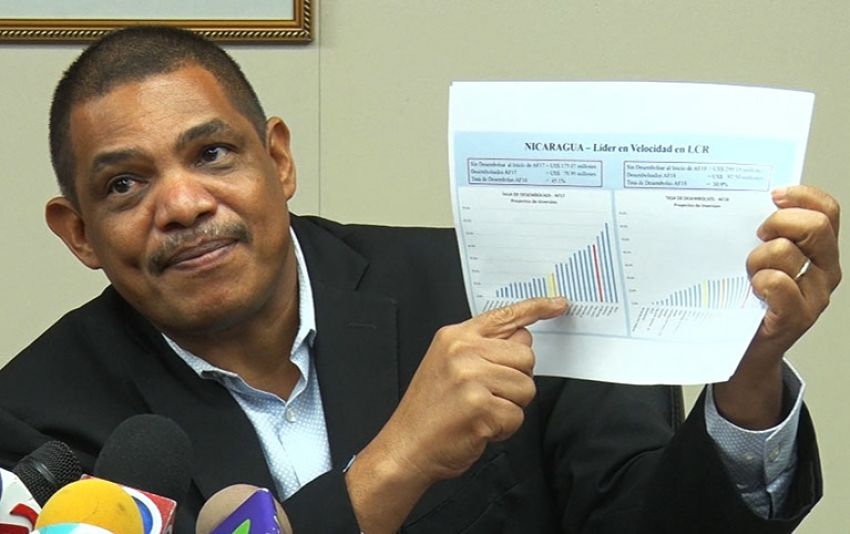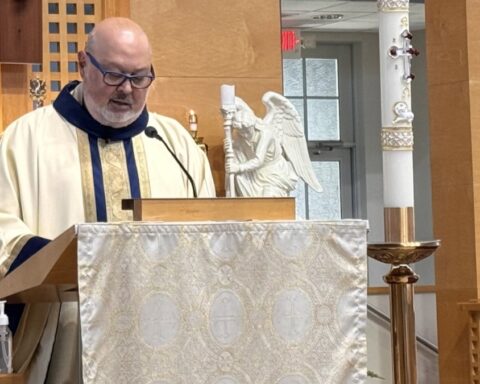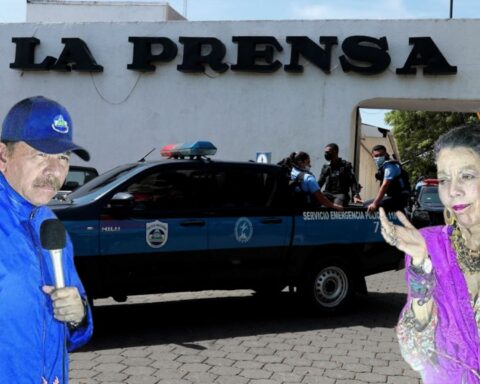The Minister of Finance and Public Credit, Iván Acosta, presented this Saturday, October 15, the draft bill for the General Budget of the Republic 2023, before the First Secretariat of the National Assembly of Nicaragua. Three days later, the text of the second most important law in the nation remains unknown.
This is the second year in a row that the regime has acted in this way.. In previous years, the preliminary draft was delivered to the deputies of the Production, Economy and Budget Commission of the National Assembly, which facilitated its knowledge by all the benches, the economists, the analysts… and the journalists.
“I would not be surprised if the papers that Iván Acosta appears handing over to the deputy [Loria] Dixon [primer secretaria de la Asamblea]were just that: papers, to make it appear that they met the requirement, and deliver the real bill when they have it ready, “he told CONFIDENTIAL an economist who preferred anonymity.
The project of the General Budget of the Republic for the year 2022 –finally presented by Acosta before the parliamentary plenary until November 11– reflected income of 91,542.5 million córdobas, and total expenses of 91,802.2 million, with a deficit before donations of 259.7 million córdobas.
At the end of the first semester of this year, the incorporation of 3822.5 million córdobas, coming from various multilateral entities, allowed an increase in the allocations destined for ministries such as Health; Energy and Mines; Tax authorities; Transportation; Agricultural; Education; and several smaller entities, such as the National Police, which increased the expenditure budget by 4.2%, to 95,624.7 million.
What is expected in the 2023 General Budget
On the other hand, it is to be expected that the draft budget for next year will exceed the barrier of one hundred billion córdobas, both in terms of income and expenses, especially when considering the extraordinary evolution of tax revenuesas reflected in the Budget Execution Report for the period January to June 2022, published by the Treasury.
Until that moment, the tax collection made through the General Directorate of Revenue (DGI), and the General Directorate of Customs Services (DGA), of 58 209.3 million córdobas, (68.6% of the budgeted amount to be collected throughout the year ); exceeded by 32.6% (C$14,325.1 million) the goal set for the first semester, in addition to being 20.6% higher (C$9,948.0 million) than what was observed in the same period of 2021.
Both the DGI and the DGA are pointed out by various businessmen as the ‘spearheads’ of a government extortion system which points to extract from companies the greatest amount of resources possible, in a scenario in which many donors and aid workers have been expelled from the countryor chose to take their resources elsewhere.
The last installment to the INSS
The 2023 budget project should also include the payment of the installment number 50 of the historical debt with the Nicaraguan Institute of Social Security (INSS), with which this form of financing would be terminated, and another would have to be sought that would allow the financial viability of that entity to be maintained, to which 1,086.9 million córdobas were allocated for this year, of which the On June 30, 358.5 million had already been transferred.
Although it is very expensive to maintain the INSS, the State has no choice but to continue injecting it with resources, since the consequences of allowing its bankruptcy are simply catastrophic, to the point that experts always point out that no Government in the world has ever allowed the total bankruptcy of your pension system.
And the constitutional transfers?
Another element to analyze will be that of constitutional transfers, especially the one that requires allocating 10% of the budget to mayors, a mandate that the Administration of Daniel Ortega and Rosario Murillo has ignored in recent years, by allocating around 4.0% of those resourceswith preference for communes ruled by those loyal to the ruling family.
The public debt, the projected growth rates of the gross domestic product, the calculation of the average price of a barrel of oil, the expected amounts of raising external resources in the form of loans and donations, and the percentage of increase in wages of public sector workersare other lines that will allow us to glimpse -when the budget project is presented- the direction that the economy may follow in the year to come.








